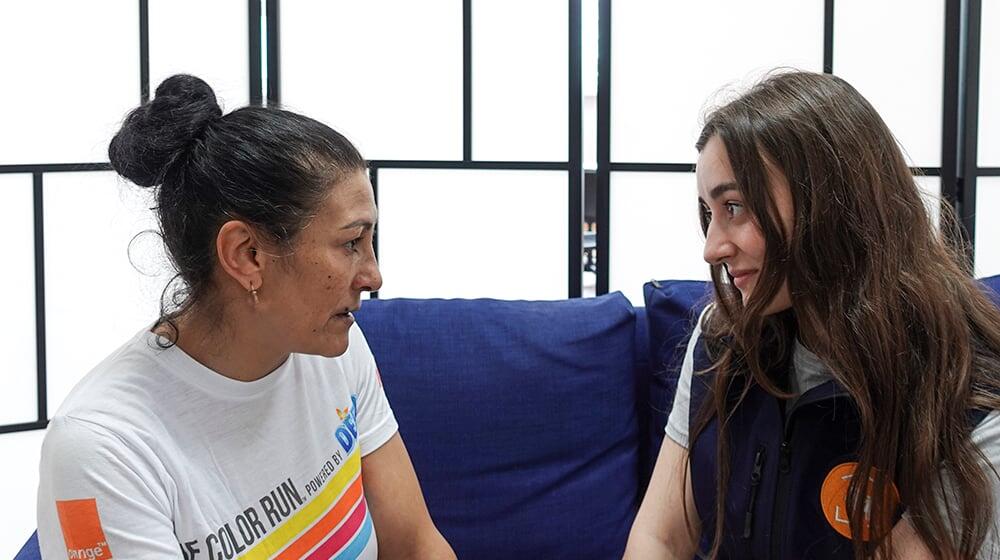Bucharest, Romania. Three months after Russia’s full-scale invasion of Ukraine started, in April 2022, Angela Ciobotaru, in her mid-fifties, from Odesa, fled to Romania with her grandchildren, nephew and nieces.
“My daughter had just given birth, so we had a newborn with us,” she said. “The weather got extremely cold and a few of the children got sick. When we arrived in Romania they were treated for malnutrition and pneumonia.”
Ms. Ciobotaru is one of over 2.5 million people, mostly women and children, who have crossed the border into Romania. More than a year after the full-scale invasion started, Romania remains an important host country for Ukrainian refugees. As of May 2023, over 94,000 refugees who fled the conflict still live in Romania.
In response to the crisis, UNFPA’s partners, supported by the Government of Romania, established four Women and Girls Safe Spaces (WGSS) in the cities of Bucharest, Baia Mare, Brașov and Târgu Mureș. The spaces provide refugees coming from Ukraine with a safe environment to assist them with their reproductive health needs and help survivors of domestic and gender-based violence.
The safe space in Bucharest, the capital of Romania, is run by the Necuvinte NGO and forms part of a shelter that currently hosts 90 refugees. Some refugees stay long-term, while others remain for just a few nights. On average, 20 people visit the centre daily to take part in activities promoted on social media.
“I have attended some of the activities about sexual and reproductive health organized by the safe space,” said Ms. Ciobotaru, who was recently hired by the shelter to work as a cleaner. “Not only have I learned a lot, but I have been able to talk about certain topics such as menopause and breast cancer prevention more freely.”
Soon after the full-scale invasion began, thousands of refugees arrived in the Maramures region in north-western Romania, on the border with Ukraine. Many refugees settled in the city of Baia Mare, which is only 50 km from a popular border crossing.
To respond to the influx, UNFPA, together with the East European Institute for Reproductive Health, set up a safe space in Baia Mare, run by the ASSOC NGO, to provide mental health and psychosocial support services to refugee women. The safe space has an in-house psychologist who offers individual and group psychotherapy and a nurse who can refer clients to medical specialists when needed.
“I only had minutes to run out of my house before it was hit by an explosion, and then I lived in a basement for two weeks,” said Tamara Dutova, a retired nurse from Kharkiv, in eastern Ukraine, who now lives in Baia Mare with her daughter and two grandchildren. “My house was destroyed. It’s still hard to talk about it, but group therapy really helps. I was able to share my story with other women who had similar experiences.”
Most women learn about the safe space in Baia Mare through social media or word of mouth. Upon arrival, they receive information on the services available and a dignity kit which includes essential items such as underwear and personal hygiene products. Then, if they want to, they can register with the national health system, book medical appointments and attend activities and workshops.
“If it wasn’t for the safe space in Bucharest, it would have been very difficult to continue my chemotherapy here,” said Halyna Djulay, 69, a retired legal expert, who fled Mykolaiv, in southern Ukraine, in April 2022, with her adolescent daughter. “They helped with appointments, arranging translation and transportation and I am better now.”
The language barrier remains a significant obstacle for many refugees in Romania, particularly when it comes to accessing medical and psychosocial care, legal counselling, education and the labour market.
UNFPA is supporting local partners, including the Ministry of Health and the National Agency for Equal Opportunities, in building their capacities to provide services to survivors of gender-based violence. This includes training staff at ten newly opened referral centers across the country, as well as conducting training on the clinical management of rape and intimate partner violence.
This helps Ms. Ciobotaru, and thousands of refugees like her, access the services they need and rebuild their lives as they wait for conditions to be right to return to Ukraine.
“I would like to go home to Ukraine. But in the meantime, I feel safe here.”



